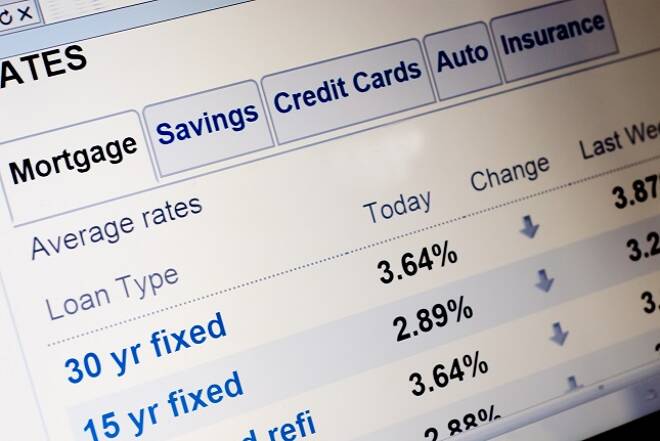Advertisement
Advertisement
U.S Mortgages – Rates Hit Reverse
By:
Mortgage rates saw the largest weekly fall since January 2015 as the global financial markets balked at rising tensions over trade and weaker data.
After a steady week that came off the back of an 11 basis point jump in 30-year fixed mortgage rates in the week ending 8th November, mortgage rates hit reverse last week with a 13 basis point slide to 4.81% the largest weekly fall since January 2015, according to figures released by Freddie Mac.
The reversal saw mortgage rates pull back to levels last seen in October, some relief coming for prospective home buyers that were either forced out of the housing market or were holding out in hopes of a reversal.
A pullback in U.S Treasuries through the shortened week came as demand for the save havens continued amidst a choppy week in the equity markets, with jitters over the global economic outlook, the ongoing U.S trade war with China and the Italian government’s budget clash with the EU weighing through the week, which ultimately left the Dow down 4.44% for the week, with the S&P500 and NASDAQ also deep in the red, with losses of 3.79% and 4.26% respectively.
Economic data released out of the U.S over the last week was on the lighter side, but included, the weekly jobless claims numbers, October housing figures, durable goods orders and finalized consumer sentiment numbers for November.
While a slide in durable goods orders in October contributed to the negative economic outlook, orders falling by 4.4%, of greater concern would have been the October housing numbers, with building permits falling and housing start and existing home sales increases barely making a dent into September’s slides, concerns over the housing sector contributing to the reversal in the equity markets.
Applications have continued to slide and, while the latest pullback in rates could lead to a pickup in demand for the week ending 23rd November, prospective home buyers may start getting a bit edgy if economic indicators continue to deteriorate further.
Freddie Mac weekly average rates for new mortgages as of 21st November were quoted to be:
- 30-year fixed rate loan slid from 4.94% to 4.81% in the week, while up from 3.92% a year ago. The average fee fell from 0.5 points to 0.4 points.
- 15-year fixed rates fell from 4.36% to 4.24% in the week, while up from 3.32% from a year ago. The average fee rose from 0.4 points to 0.5 points.
- 5-year fixed rates eased from 4.14% to 4.09% in the week, while up from last year’s 3.22%. The average fee held steady at 0.3 points.
Mortgage Bankers’ Association Rates for the week ending 16th November were quoted to be:
- Average interest rates for 30-year fixed, backed by the FHA, remained unchanged at 5.08%, with points rising from 0.55 to 0.63 (incl. origination fee) for 80% LTV loans.
- Average interest rates for 30-year fixed with conforming loan balances decreased from 5.17 to 5.16, with points easing from 0.55 to 0.48 (incl. origination fee) for 80% LTV loans.
- Average 30-year rates for jumbo loan balances decreased from 4.98% to 4.88%, with points rising from 0.28 to 0.29 (incl. origination fee) for 80% LTV loans.
Weekly figures released by the Mortgage bankers Association showed that the Market Composite Index, which is a measure of mortgage loan application volume, fell by just 0.1% in the week ending 16th November, following on from the previous week’s 3% slide, week-on-week.
The Refinance Index fell by 5%, in the week ending 16th November to the lowest since December 2000, following the previous week’s 4.3% fall, with the share of refinance mortgages falling from 39.4% to 38.5%, reversing the previous week’s gain.
For the week ahead, it’s a particularly busy week, key stats scheduled for release including September November consumer confidence, the FED’s preferred Core PCE Price Index figures, with finalized 3rd quarter GDP numbers also due out.
For the housing sector, September house price figures and October new home and pending home sales are also scheduled for release that will provide further guidance on the state of the housing sector.
While the numbers will certainly have an influence on yields, it’s ultimately going to boil down to Trump’s one-on-one with Chinese Premier Xi, with Treasury yields likely to see some sizeable moves on chatter ahead of next week’s G20 Summit. The APEC Summit did little to ease market jitters, with Premier Xi and U.S Vice President Pence finding little common ground on both trade and security and if that’s a sign of things to come, mortgage rates will likely ease back further in the coming weeks.
About the Author
Bob Masonauthor
With over 28 years of experience in the financial industry, Bob has worked with various global rating agencies and multinational banks. Currently he is covering currencies, commodities, alternative asset classes and global equities, focusing mostly on European and Asian markets.
Advertisement
